

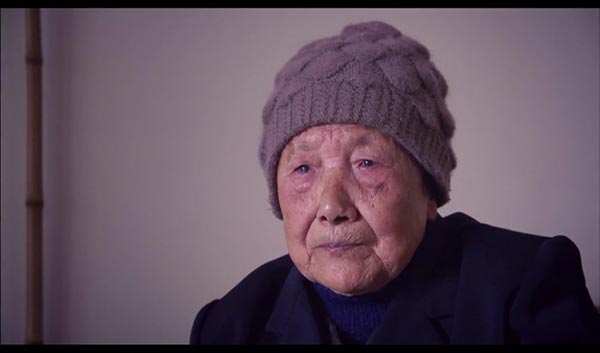
Xia Shuqin (above), 85, one of a number of war survivors. (Photo source:China Daily)
BEIJING, Aug. 20 -- A terrified family cowering under a kitchen table depicted in black and white animation is one of the most haunting images in a new documentary on China's role in World War II, which will be broadcast next week.
It tells the story of how Xia Shuqin, despite being stabbed three times, and her sister, managed to survive the incident in Nanjing in 1937. Their mother, other family members and a neighbor were either beaten or bayoneted to death at the scene.
Xia, now 85, met President Xi Jinping last December. She is one of a number of war survivors interviewed in World War II: China's Forgotten War, a co-production between China Intercontinental Communication Center and the US satellite TV channel, History.
The first of two episodes will be aired on Aug 29, ahead of the 70th anniversary commemorations in Beijing. It will be later shown on CCTV 9.
Zhang Tianzhu, 27, the film's producer, says depicting the story using animation was one way of re-creating what actually happened.
"There is very little footage and most of it is from the US or Taiwan and not the mainland. We decided to use simple grainy animation because it is like an old, dark memory," she says.
The documentary is presented by Rana Mitter, Deutsche Bank director of the Dickson Poon China Center and professor of modern Chinese history at Oxford University. "What we wanted to get across was the role China played in the war, which often gets lost in most Western histories of the conflict," he says. Mitter is author of China's War With Japan, 1937-1945, the Struggle for Survival, now published in Chinese and one of the most important recent books on the conflict.
"There is always more focus on Hitler and the European conflict and when it comes to the Pacific War it is always the Americans, Australians and the British fighting the Japanese. China's war with Japan is often underplayed because it is seen as Asians fighting Asians and one where the West does not have a big role."
The first episode begins with Mitter in Poland, making a link between the deaths that took place in Warsaw's Wola district as a result of Nazi barbarism with the atrocities committed by the Japanese when they invaded Nanjing and raped between 20,000 and 40,000 women.
"We opened the film in this way because we wanted to show that when the mass murders took place in Poland, a similar incident on a bigger scale had already taken place on the other side of the world."
China Intercontinental Communication Center, which has previously done co-productions with the BBC, the National Geographic Channel and Arte, the French-German TV network, decided to make the film after Spring Festival in 2014.
They recruited Singapore-based InFocus Asia as the production company and had lengthy discussions as to whether to have a host presenter.
"Most documentaries like this do not have a host," says Peter Chen, the 36-year-old head of co-production at CICC.
"When we planned the documentary we were unaware of Rana's book, which was only published in Chinese last year. People who are good at writing books are not always the right host for a TV show."
Mitter, although not a TV presenter, does host a radio show called Free Thinking on BBC Radio 3 in the UK.
The films were shot over 15 days in a number of locations, including Shanghai, Nanjing, Tengchong in Yunnan province, Tai'erzhuang in Shandong province and Chongqing.
It highlights many of the key points of the war, including the Chinese decision to breach dykes along the Yellow River to stop the Japanese advance, which caused famine in China's Henan farm belt and also the Japanese bombing of Chongqing, China's wartime capital, from 1938 onwards.
"Apart from Guernica during the Spanish Civil War, which was famously depicted by Picasso, Chongqing was the first city ever to be aerially bombarded. Some 12,000 people died and although that is fewer than in the London Blitz, it is not considerably smaller proportionate to the number of people who lived there," says Mitter.
The strength of the documentary is the interviews with the survivors, now in their 80s and 90s, including 94-year-old Perry Rao, who fought in the battle of Hengyang, a key central China conflict, in 1944 as a teenager.
Mitter agrees that some of their stories are "pretty gut punching" but he hopes it will create interest not just in China's role in the war but Chinese history generally.
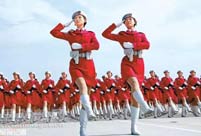 In pics: album of PLA grand military parades
In pics: album of PLA grand military parades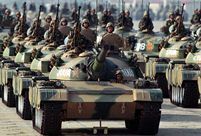 Chinese tanks in National Day Parade
Chinese tanks in National Day Parade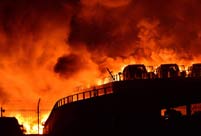 In pics: shocking aftermath of Tianjin blasts
In pics: shocking aftermath of Tianjin blasts
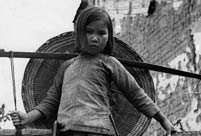 Indomitable Chinese people during WWII
Indomitable Chinese people during WWII
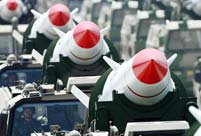 Awesome Chinese missiles
Awesome Chinese missiles Amazing photos of Chinese Air Force in parade
Amazing photos of Chinese Air Force in parade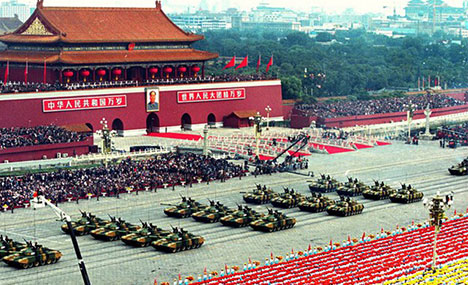 Chinese tanks in National Day Parade
Chinese tanks in National Day Parade Striking moments when strategic missiles are launched
Striking moments when strategic missiles are launched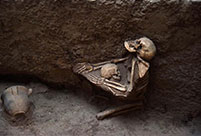 Shocking scenes found in 4000-year-old earthquake relic
Shocking scenes found in 4000-year-old earthquake relic Tianjin explosion: Latest updates
Tianjin explosion: Latest updates US intrudes on China’s anti-graft drive
US intrudes on China’s anti-graft drive Bangkok explosion: Latest updates
Bangkok explosion: Latest updates Expats hope Chinese authorities make it easier for them to observe legal procedures
Expats hope Chinese authorities make it easier for them to observe legal proceduresDay|Week